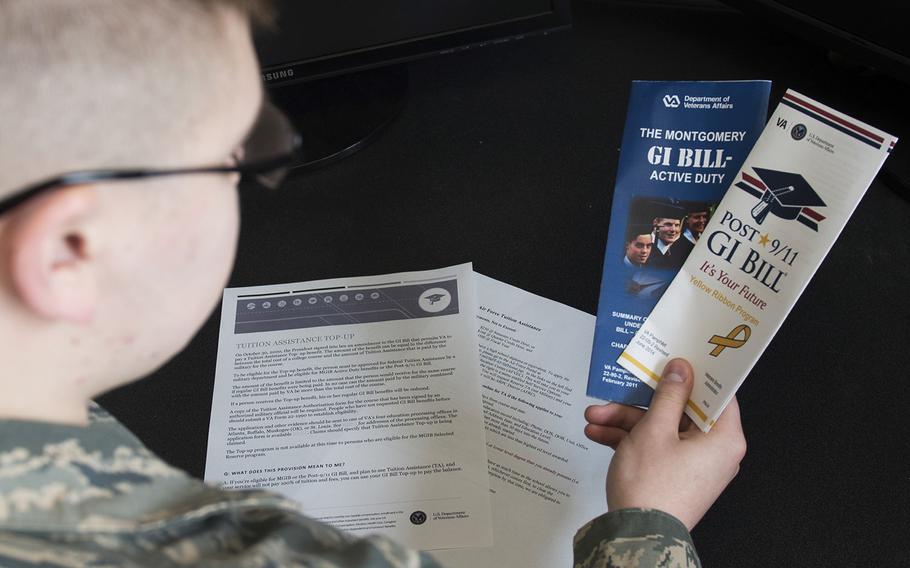
(U.S. Air Force)
WASHINGTON — About 21,000 student veterans will see lower living stipends next semester after the Department of Veterans Affairs finally implements a law that alters how students are paid when they attend satellite campuses.
For veterans who take classes at satellite or branch campus, their monthly allowances — which they use for housing, utilities and food — will be based on the cost of living in the city where they’re taking classes, rather than defaulting to their school’s main campus.
About 59,000 veterans are expected to receive increased payments because of the change, but about 21,000 will get less money, the VA estimated Tuesday. GI Bill benefits go to about 500,000 students each semester.
“These changes have the potential to impact thousands,” said Rep. Phil Roe, R-Tenn., the ranking Republican on the House Committee on Veterans’ Affairs. “I’m concerned that despite VA’s best efforts, some students will be surprised when they see an unexpected decrease in payment.”
The change was part of the Forever GI Bill, a major overhaul of veterans’ education benefits that Congress passed in 2017. The new calculation was supposed to go into effect in August 2018, but technology failures resulted in the VA sending out incorrect monthly housing stipends to thousands of veterans. Some veterans received no monthly payments at all.
After outcry from veterans and lawmakers last year, the agency halted the rollout. Now, it’s trying again.
The VA is expected to meet a Dec. 1 deadline to put the change into effect.
The Economic Opportunity Subcommittee, part of the House Committee on Veterans’ Affairs, held a hearing Tuesday to determine whether the VA was ready.
“We are on track to meet the target date,” said Paul Lawrence, VA Undersecretary for Benefits. “We are ready to roll.”
In addition to using the new calculation in the spring semester, the VA will start sending out retroactive payments to students who received lower housing payments since August 2018 than they should have under the new law.
For those students who received higher living stipends over the past year than what’s called for under the law, the VA plans to distribute notifications that the overpayments will be waived. Congress passed a law in December 2018 that prevents the VA from trying to collect money from those students.
The VA is hiring 500 temporary employees to help with the extra work, said Charmain Bogue, executive director of Education Services at the VA. The agency will also require employees to work mandatory overtime before January, which is when the first payments are expected to go out, Bogue said.
Lawmakers expressed concerns Tuesday that some of the 21,000 students who are set to receive lower payments would be unaware of the changes until they received their checks next semester.
“Our phones are going to ring off the wall,” Roe said. “Students don’t have too much money, so when you reduce the amount they have, that’s going to be a real impact. The quicker they get that information, the better.”
The VA sent emails about the changes, as well as posted on social media, Lawrence said. The agency also identified the satellite schools where students are expected to receive smaller checks and asked them to notify veterans at those campuses.
Some students could receive hundreds of dollars less each month because of the change. Citing one example, Bogue said San Francisco has a housing allowance of $4,300 each month, while Sacramento has $2,500. Under the new calculation, a student attending a Sacramento branch of a San Francisco-based school would receive the lower rate.
Bogue said the VA would offer a one-time relief payment for students who unexpectedly receive less money at the start of the spring semester. Those payments typically take three months to process, but the agency is working to turn those around within two weeks, she said.
As the VA implements the new calculation, Lawrence asked lawmakers for their help explaining that the smaller payments were because of a law change, not a VA mistake.
“Our student veterans live on modest incomes, and the housing allowance will go down in certain situations,” Lawrence said. “We’d like your help to communicate this is not a VA failure – this is how the law and the rules work. We want to make sure that’s understood.”
Wentling.nikki@stripes.com Twitter: @nikkiwentling